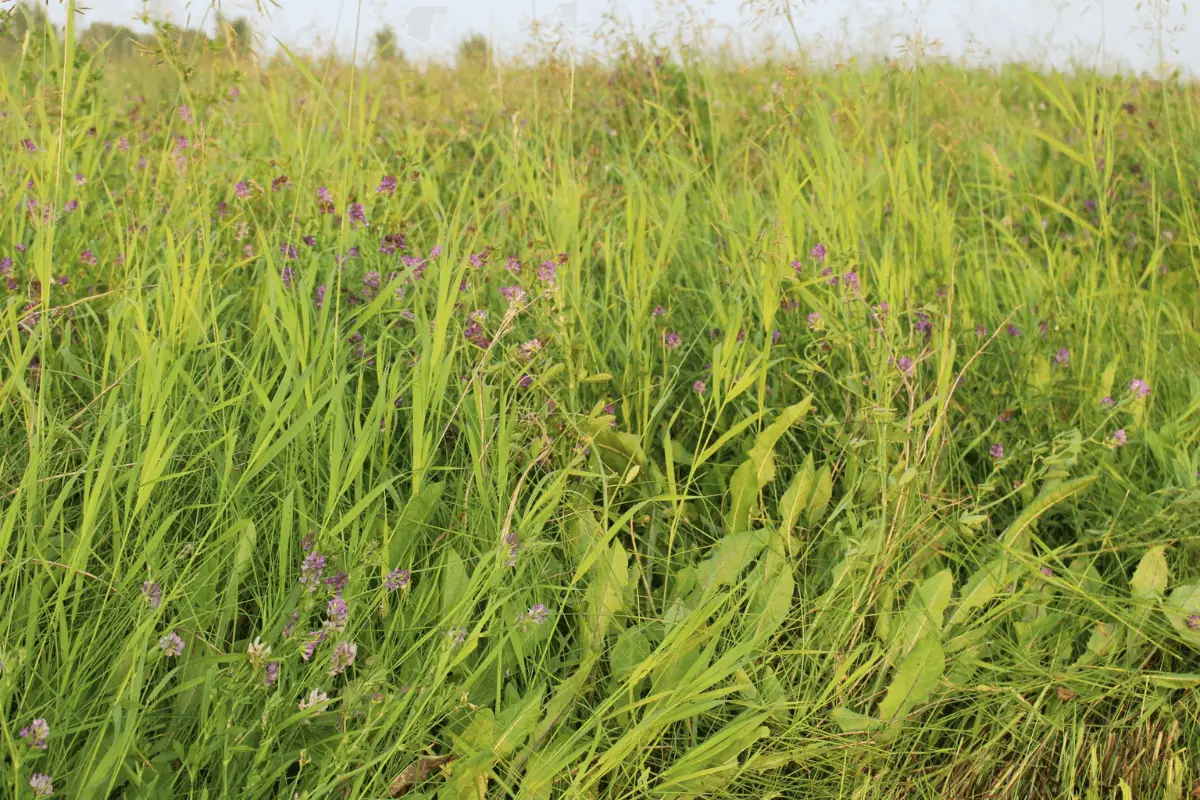TheHerbProf.com is a treasure trove of knowledge for those interested in natural healing and herbal remedies. The website is run by Paul Johnston MD. A naturopathic who has not only received extensive education in the field but also has personal experience in self-healing.
As a nutritionist, I often get asked about the health benefits of different foods. One food that comes up frequently is alfalfa, also known as Medicago sativa or lucerne. Alfalfa is a herb that is commonly used as a forage crop for livestock, but it also has many potential health benefits for humans.
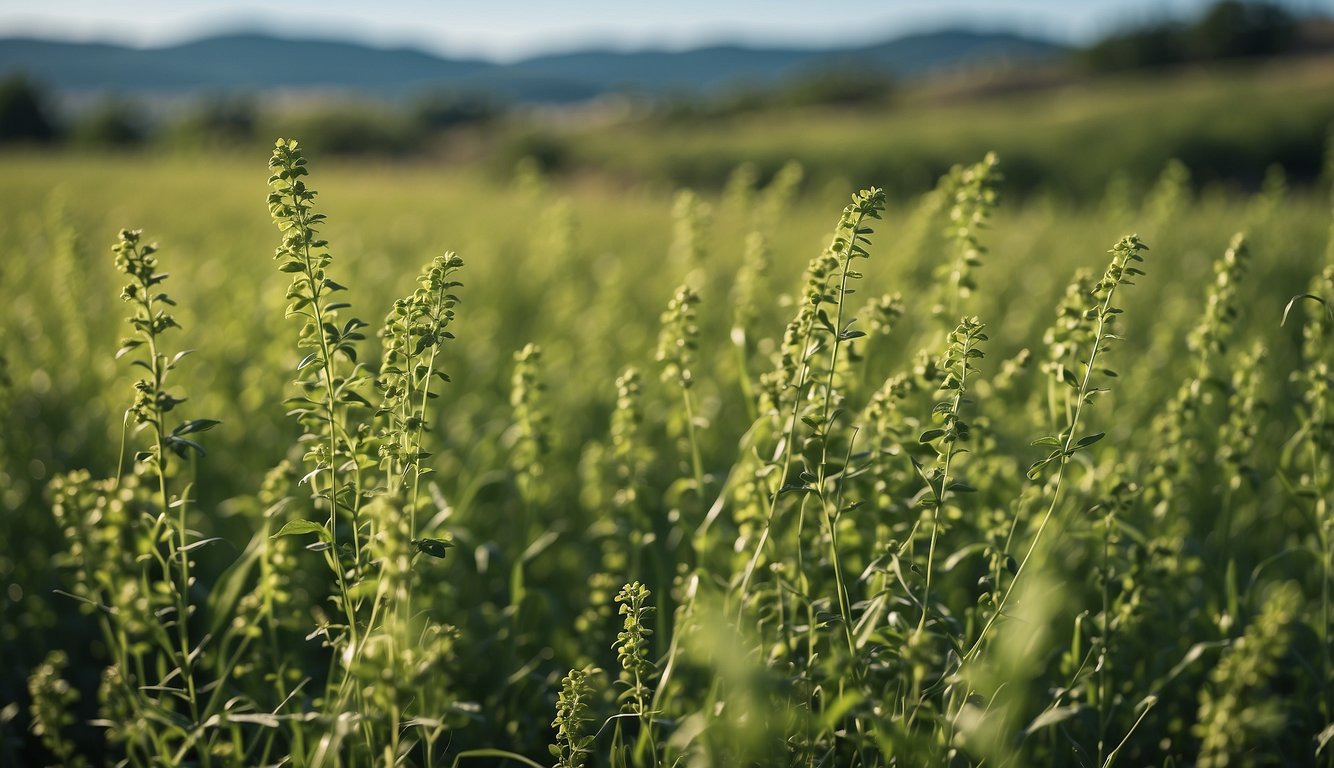
Alfalfa is a nutrient-dense food that is rich in vitamins, minerals, and antioxidants. It is a good source of vitamin K, which is important for blood clotting and bone health, as well as vitamin C, which is an antioxidant that helps to protect cells from damage. Additionally, lucerne contains minerals such as calcium, magnesium, and potassium, which are essential for maintaining healthy bones, muscles, and nerves.
Botanical Profile
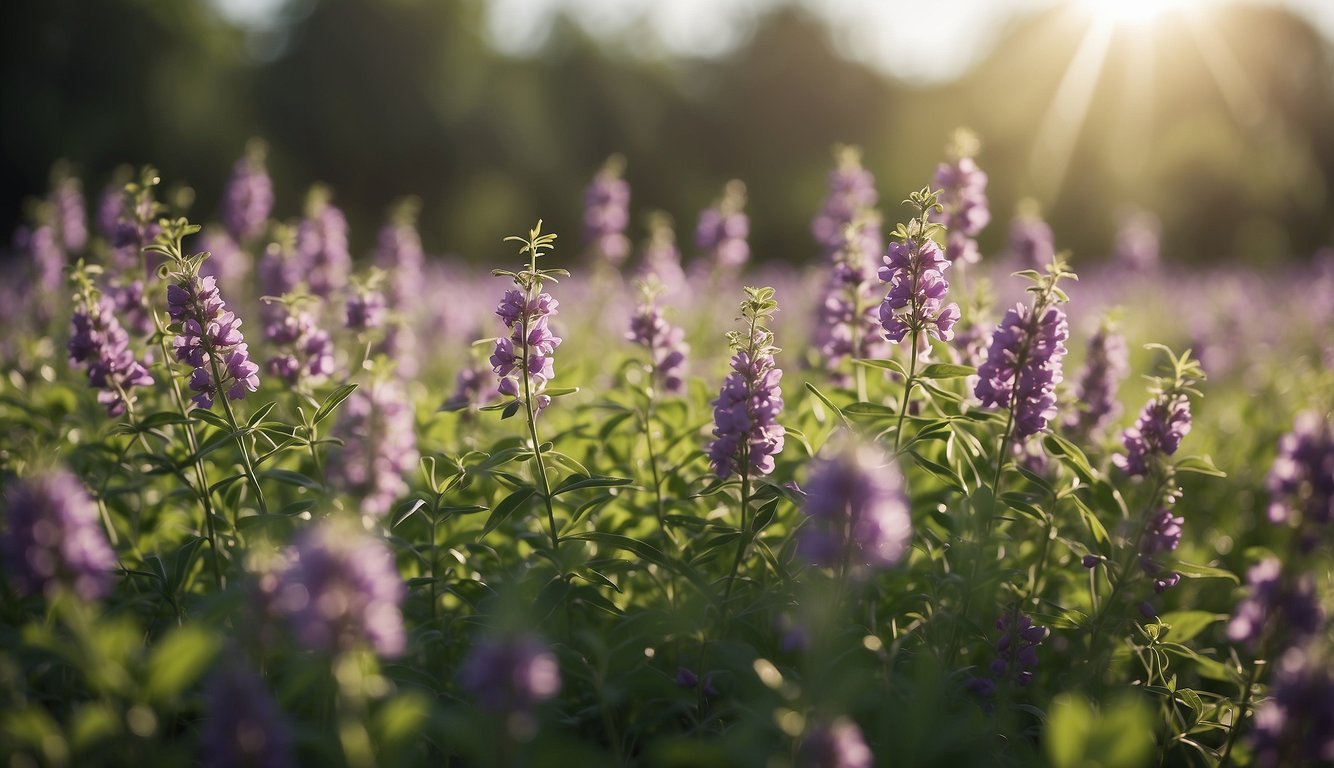
Species and Varieties
I will start by discussing the botanical profile of Alfalfa (Medicago Sativa). Lucerne is a perennial flowering plant that belongs to the legume family Fabaceae. It is also known as lucerne and is cultivated as an important forage crop in many countries around the world. Lucerne is native to Central Asia and has been cultivated for over 2,000 years.
The plant has a deep root system that can reach up to 15 feet deep in the soil. The stems are erect and can grow up to three feet tall. The leaves are trifoliate, meaning they have three leaflets, and are typically 1-3 inches long. Alfalfa flowers are purple and bloom from June to September.
There are many different varieties of alfalfa, each with its own unique characteristics. Some of the most popular varieties include Vernal, Ranger, and Ladak. These varieties are known for their high yield and resistance to pests and diseases.
Cultivation and Harvesting
Alfalfa is a highly adaptable crop that can grow in a wide range of soil types and climates. It is typically grown as a rotation crop, meaning it is planted in between other crops to help improve soil health.
Lucerne is usually planted in the spring or fall, depending on the climate and growing conditions. The seeds are planted about ¼ inch deep in the soil and spaced about 6-12 inches apart. Once the plants have germinated, they are typically irrigated regularly to ensure they receive enough water.
Alfalfa is typically harvested two to three times per year, depending on the growing conditions and the intended use. The first cutting is usually the highest yielding and is harvested when the plants are in full bloom. The second and third cuttings are typically harvested when the plants have regrown to a height of 6-8 inches.
Alfalfa is a highly adaptable and versatile crop that has been cultivated for over 2,000 years. It is known for its deep root system, trifoliate leaves, and purple flowers. Lucerne is typically grown as a rotation crop and is harvested two to three times per year.
Nutritional Composition
As a member of the legume family, alfalfa is a nutrient-dense plant that is rich in various vitamins, minerals, protein, and fiber. Here are some of the essential nutrients that lucerne provides:
Vitamins and Minerals
Alfalfa is an excellent source of vitamins and minerals, including vitamin C, vitamin K, iron, magnesium, potassium, calcium, copper, manganese, folate, and vitamin E. One cup of lucerne sprouts contains 10% of the recommended daily intake (RDI) of vitamin C, 71% of the RDI of vitamin K, and 3% of the RDI of iron.
Protein and Fiber Content
Alfalfa is also a good source of protein and fiber. One cup of alfalfa sprouts contains 1.3 grams of protein and 0.6 grams of fiber. The fiber in lucerne helps to promote healthy digestion and can help to lower cholesterol levels.
Alfalfa is also low in calories, making it an excellent addition to a healthy diet. One cup of lucerne sprouts contains only eight calories, making it an ideal food for people who are trying to lose weight.
Alfalfa is a nutrient-dense plant that provides a wide range of vitamins, minerals, protein, and fiber. Adding lucerne to your diet can help to promote overall health and wellbeing.
Health Benefits
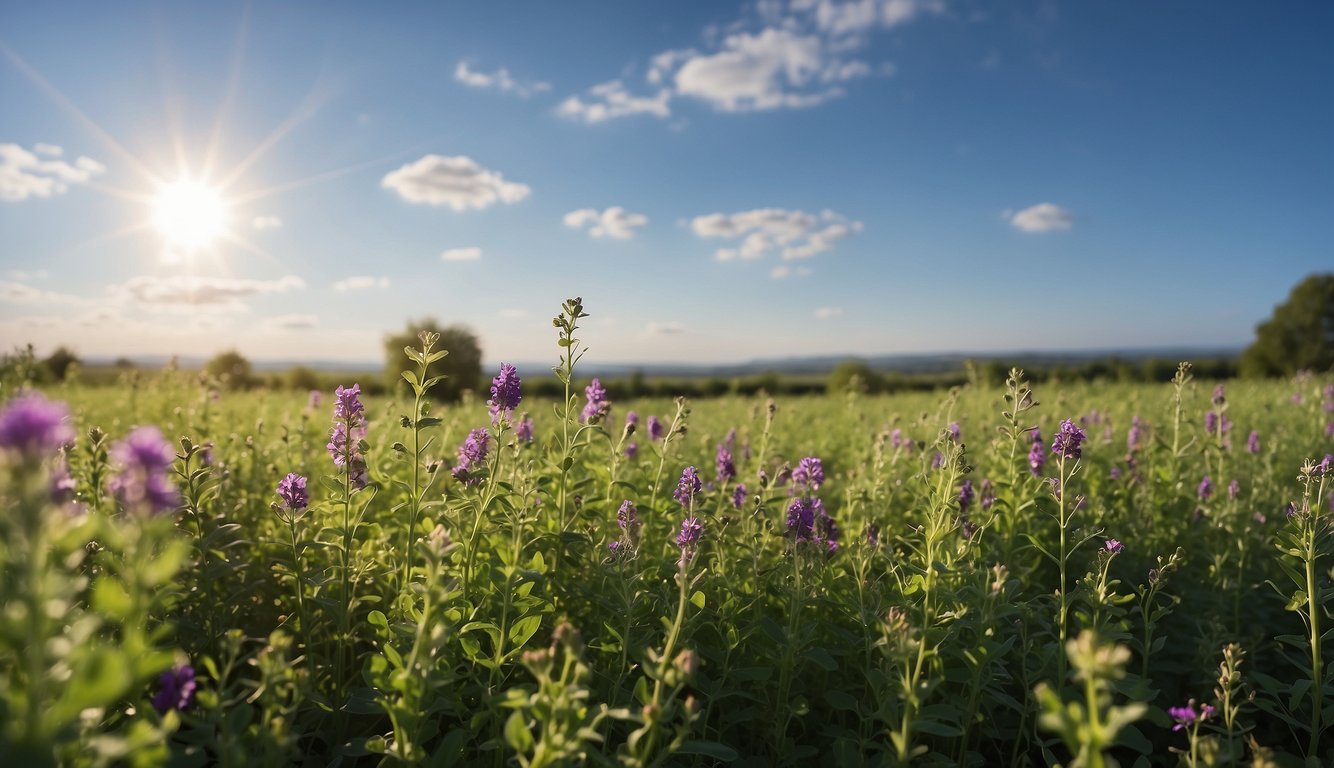
Alfalfa is packed with nutrients and has been used for centuries as a medicinal herb. It has several potential health benefits that have been scientifically evaluated. In this section, I will discuss some of the most important health benefits of alfalfa.
Cardiovascular Health
Alfalfa is known to have a positive effect on cardiovascular health. It helps to lower cholesterol levels and reduce the risk of heart disease. According to a study published in the Journal of Medicinal Food, lucerne can reduce cholesterol levels by up to 18.8% in just eight weeks. The plant is also rich in phytoestrogens, which can help to regulate estrogen levels in the body and reduce the risk of heart disease in women.
Medicago Sativa
Nutritionally some modern herbalists call alfalfa the “Big Daddy of them all” because lucerne is so well-rounded in the vitamins and minerals that it can supply to the body. The vitamin and mineral-rich juice that is extracted from lucerne is called Chlorophyll; chlorophyll is almost identical to human hemoglobin and has been used by Naturopaths and some religious groups before, during, and after operations.
Alfalfa is a legume found at the edges of fields, in low valleys and is widely cultivated for livestock feed. Alfalfa has an erect, smooth stem that grows from an elongated taproot to a height of a foot or more. The flowers are blue-to-purple during the summer months and later produce spirally coiled seedpods. The seeds produce an excellent sprout that can be grown at home or purchased at most grocery and health food stores.
Blood Sugar Regulation
Alfalfa has been shown to help regulate blood sugar levels, making it an excellent food for people with diabetes. The plant is rich in fiber, which slows down the absorption of sugar in the bloodstream. This helps to prevent spikes in blood sugar levels and can help to reduce the risk of developing type 2 diabetes.
Digestive Support
Alfalfa is an excellent source of fiber, which makes it an ideal food for promoting digestive health. The fiber in alfalfa helps to promote regular bowel movements and can help to prevent constipation. It also helps to feed the beneficial bacteria in the gut, which can improve gut health and boost the immune system.
Menopausal Symptom Relief
Alfalfa has been shown to provide relief for menopausal symptoms such as hot flashes. According to a study published in the Journal of Alternative and Complementary Medicine, women who took an lucerne supplement experienced a significant reduction in the number and severity of hot flashes.
Alfalfa is a nutrient-rich plant that offers several potential health benefits. It can help to promote cardiovascular health, regulate blood sugar levels, support digestive health, and provide relief for menopausal symptoms. Incorporating alfalfa into your diet is a great way to boost your overall health and wellbeing.
Best For The Immune System – Get Yours Here.
Alfalfa is loaded with beta-carotene, which supports the immune system, skin, and internal mucous membranes.
The “Big Daddy of them all” is so high in calcium that the ashes from its leaves are 99% calcium. When the calcium content of alfalfa is compared to milk 1 oz of powdered milk contained 38% RDA, while 1 oz of powdered alfalfa contained 75% RDA. That same 1 oz of lucerne also has 83% more iron, 36% more magnesium, 12% more potassium, and 4% less sodium than milk.
Highly nutritional alfalfa contains vitamins A, B-1, B-6, B-12, C, E, and K-1 (a remedy for morning sickness), niacin, pantothenic acid, biotin, folic acids, and 15 to 25% proteins.
Alfalfa Uses
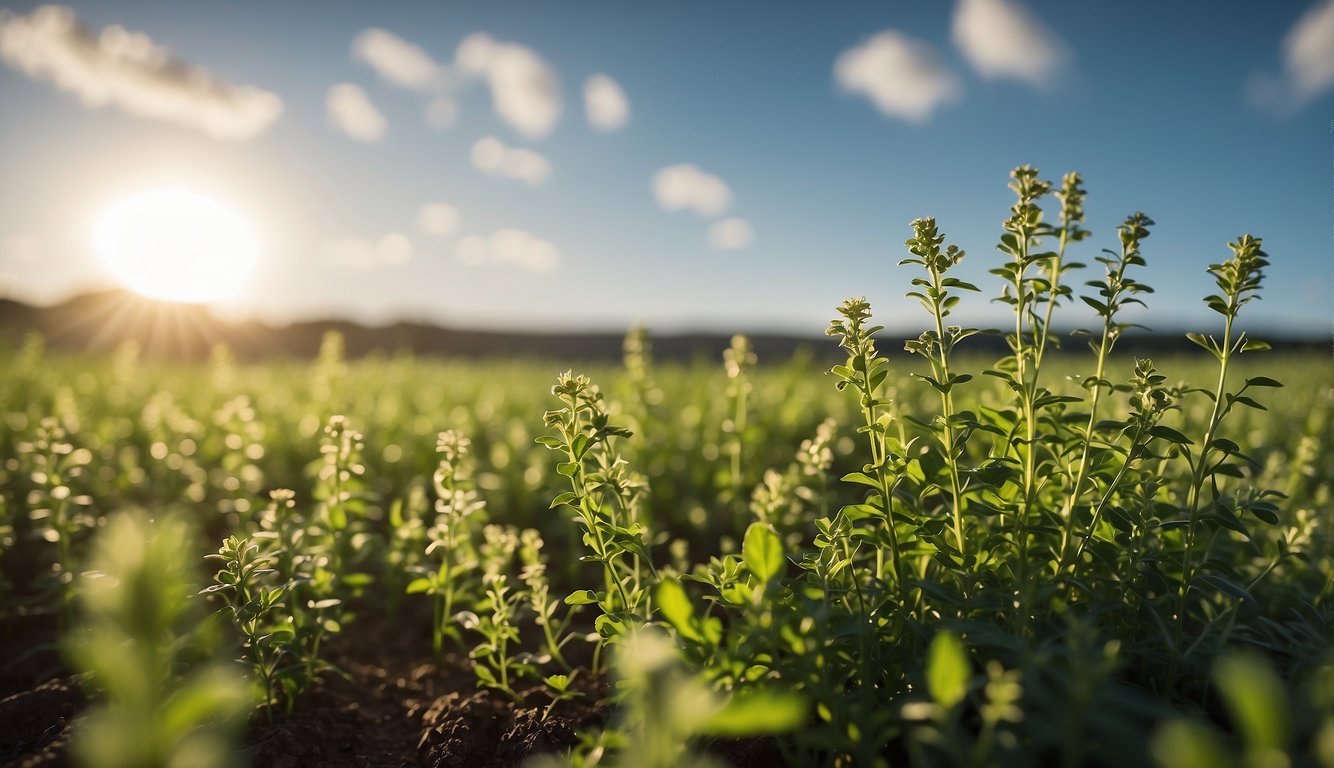
As an herb, Alfalfa has been used for centuries for its medicinal properties. It is also used in culinary applications, and as a supplement. In this section, I will explore the various uses of Alfalfa.
Culinary Applications
Alfalfa is a versatile herb that can be used in a variety of culinary applications. Its mild, nutty flavor makes it an excellent garnish for sandwiches, salads, and other dishes. Lucerne sprouts are a popular choice for sandwiches and salads, and they add a nice crunch and texture to dishes.
Alfalfa seeds can also be used in cooking. They can be sprouted or ground into a powder and used as a supplement. Alfalfa tea is another popular way to consume this herb. It is made by steeping the leaves and stems in hot water for several minutes.
Supplementation Forms
Alfalfa is available in supplement form, which makes it easy to consume on a daily basis. It is available in tablet and capsule form, and it is often combined with other herbs and nutrients to create a comprehensive supplement.
Alfalfa supplements are often used to support overall health and wellness. They are also used to support healthy digestion, promote healthy blood sugar levels, and support healthy cholesterol levels.
Alfalfa is a versatile herb that can be used in a variety of culinary applications and as a supplement. Its mild, nutty flavor makes it an excellent garnish for sandwiches, salads, and other dishes. It is also available in supplement form, which makes it easy to consume on a daily basis.
Risks and Considerations

As with any supplement or medication, it is important to be aware of the potential risks and considerations associated with alfalfa. In this section, I will discuss some of the most important factors to keep in mind.
Side Effects and Interactions
While alfalfa is generally considered safe for most people, it can cause some side effects in certain individuals. These side effects may include gas, bloating, and diarrhea. Additionally, lucerne may interact with certain medications, including blood thinners such as warfarin and hormone-sensitive conditions. If you are taking any medications or have a hormone-sensitive condition, you should speak with your doctor before taking alfalfa supplements.
Contamination Risks
Another potential risk associated with alfalfa is contamination. Raw alfalfa sprouts and supplement products derived from lucerne seeds come with potential food safety risks, such as serving as a reservoir for foodborne pathogens like E. coli and salmonella. The FDA recommends that children, the elderly, and individuals with weakened immune systems avoid consuming raw alfalfa sprouts. If you choose to consume lucerne supplements, it is important to purchase them from a reputable source and follow the recommended dosage instructions.
While alfalfa can provide a variety of potential health benefits, it is important to be aware of the potential risks and considerations associated with its use. If you have any concerns or questions about taking lucerne supplements, it is always best to speak with your doctor before starting a new supplement regimen.
Agricultural Significance
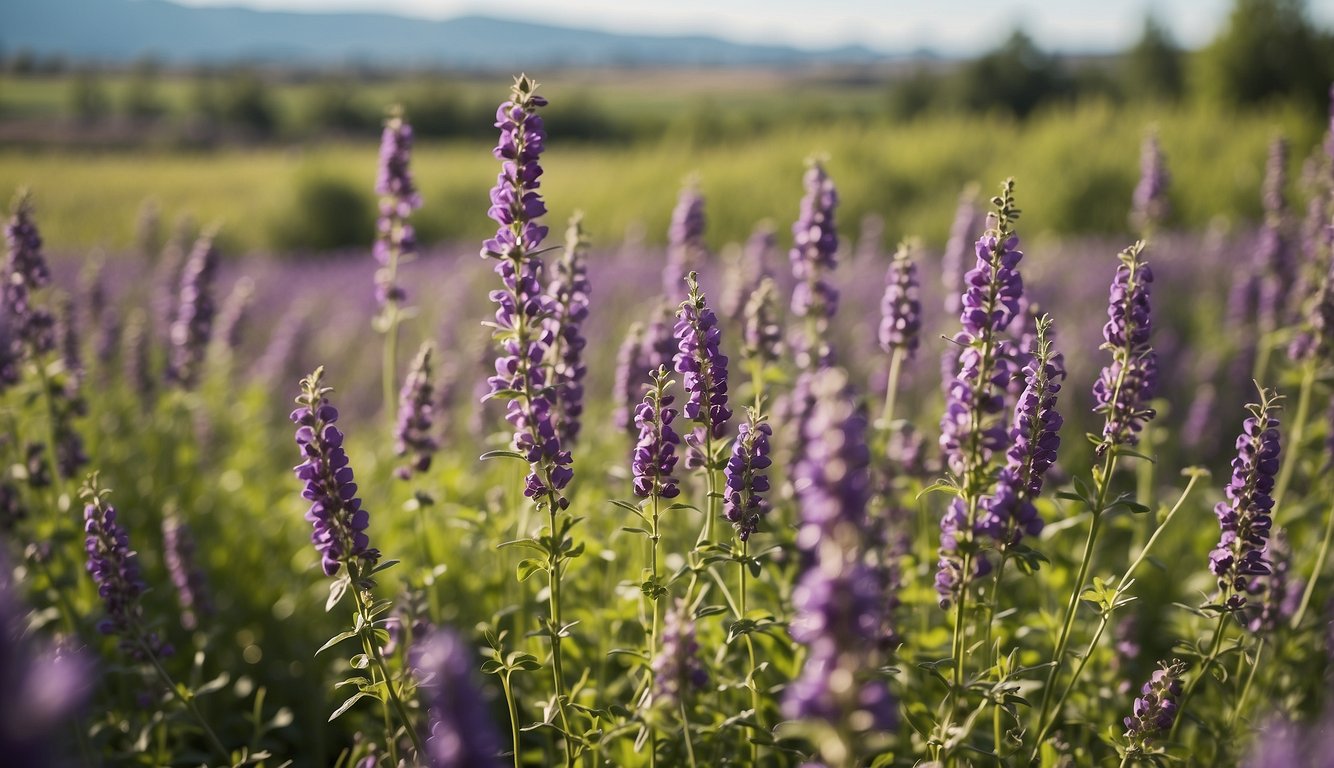
As a farmer, I have seen firsthand the importance of lucerne in modern agriculture. Alfalfa is a versatile plant that can be used for a variety of purposes, including livestock feed, green manure, and cover crops. In this section, I will discuss the agricultural significance of alfalfa and its role in sustainable farming practices.
Livestock Feed
Alfalfa is a highly nutritious forage crop that is widely used as livestock feed. It is a member of the legume family and has a high protein content, making it an excellent source of nutrition for cattle, horses, and other grazing animals. In addition, lucerne is rich in vitamins and minerals, including calcium, phosphorus, and potassium, which are essential for animal health.
Sustainable Farming Practices
Alfalfa is also an important component of sustainable farming practices. It is a perennial crop that can be grown for several years without replanting, reducing the need for tillage and minimizing soil erosion. In addition, alfalfa is a nitrogen-fixing crop, meaning that it can convert atmospheric nitrogen into a form that can be used by plants. This reduces the need for synthetic fertilizers, which can be costly and have negative environmental impacts.
Alfalfa is also an excellent cover crop, helping to prevent soil erosion and improve soil health. It has a deep root system that can help to break up compacted soils, improving water infiltration and reducing runoff. In addition, lucerne can be used as a green manure, providing organic matter and nutrients to the soil as it decomposes.
However, alfalfa is not without its challenges. The alfalfa weevil is a common pest that can cause significant damage to alfalfa crops. Farmers must be vigilant in monitoring their crops and taking appropriate measures to control infestations.
Lucerne is a highly versatile and valuable crop that plays an important role in modern agriculture. Its use as livestock feed and its role in sustainable farming practices make it a key component of many farming operations.
Alfalfa and The Herb Prof: A Dynamic Duo
Let’s talk about Alfalfa, a superstar in the world of herbs, and its special connection with our website, theherbprof.com.
Alfalfa, known for its rich nutrients and health benefits, is like a multivitamin in plant form! It’s a powerhouse of wellness that’s hard to beat.
But how does this tie into theherbprof.com? Well, we’re all about celebrating the power of herbs. And lucerne? It’s one of our top performers!
We’re a perfect pair, really. Theherbprof.com provides the stage, and Alfalfa delivers a standout performance. We highlight its benefits, and it brings a wealth of knowledge and value to our readers.
So, when you’re browsing theherbprof.com, make sure to stop by our lucerne section. It’s a dynamic duo you won’t want to miss! And remember, laughter is the best medicine, but a little Alfalfa might just be the perfect supplement!
References:
Little Herb Encyclopedia, by Jack Ritchason; N.D., Woodland Publishing Incorporated, 1995
The Ultimate Healing System, Course Manual, Copyright 1985, Don Lepore
Planetary Herbology, Michael Tierra, C.A., N.D., Lotus Press, 1988
Handbook of Medicinal Herbs, by James A. Duke, Pub. CRP Second Edition 2007
The Complete Medicinal Herbal, by Penelope Ody, Published by Dorling Kindersley
Before You Go – Check the Following Articles!
Frequently Asked Questions
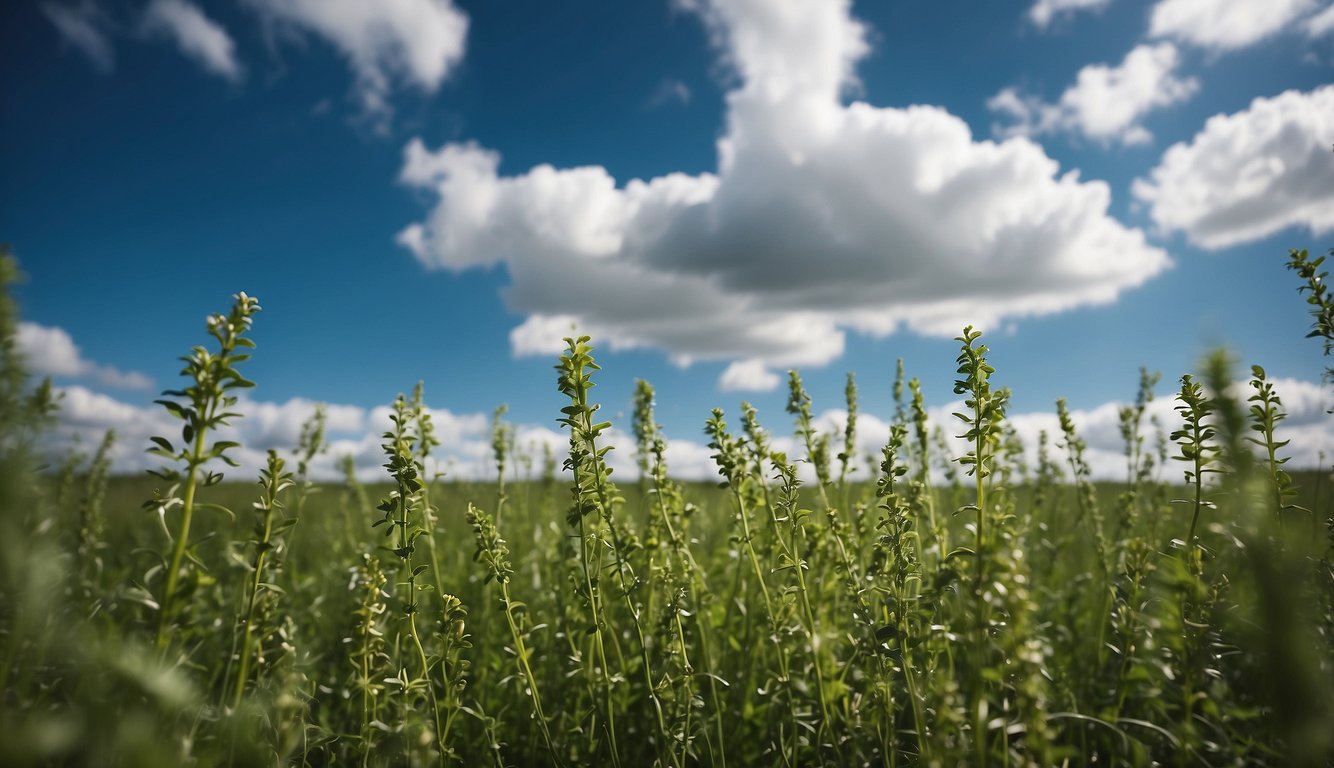
What are the health benefits of consuming alfalfa?
Alfalfa is a nutrient-rich herb that is known to have several health benefits. It is a good source of vitamins A, C, E, and K, as well as minerals such as calcium, potassium, and iron. Alfalfa is also known to be a natural diuretic, which can help reduce water retention and improve kidney function. Additionally, the herb is believed to have anti-inflammatory properties, which can help reduce pain and inflammation in the body.
How is alfalfa tea prepared and what are its uses?
Alfalfa tea is prepared by steeping dried lucerne leaves in hot water for several minutes. The tea has a mild, slightly sweet flavor and is often used as a natural remedy for a variety of health issues. Some of the potential benefits of alfalfa tea include improved digestion, reduced inflammation, and improved kidney function.
What are the considerations for human consumption of alfalfa?
While alfalfa is generally considered safe for human consumption, there are some considerations to keep in mind. For example, lucerne contains an amino acid called canavanine, which can be toxic in large amounts. Additionally, alfalfa can interact with certain medications, such as blood thinners and birth control pills. As with any dietary supplement, it is important to talk to your doctor before adding alfalfa to your diet.
How do alfalfa supplements differ from natural alfalfa?
Alfalfa supplements are typically made from dried lucerne leaves or sprouts that have been ground into a powder or pressed into tablets. While lucerne supplements can provide many of the same health benefits as natural alfalfa, they may not contain all of the same nutrients. Additionally, supplements may contain other ingredients, such as fillers and binders, that are not found in natural alfalfa.
What role does alfalfa play in agricultural practices?
Alfalfa is an important crop in many agricultural practices. It is commonly used as a forage crop for livestock, as it is high in protein and other nutrients. Additionally, lucerne can help improve soil health by fixing nitrogen and reducing erosion. It is also used as a cover crop to help prevent weed growth and improve soil structure.
What are the distinctive characteristics of alfalfa grass compared to other grasses?
Alfalfa grass is known for its deep root system, which can reach several feet into the soil. This allows it to access nutrients and water that other grasses cannot. Additionally, lucerne is a perennial plant, which means that it can survive for several years without needing to be replanted. Finally, lucerne is known for its high protein content, which makes it an important crop for livestock feed.
Alfalfa can be used therapeutically for treating:
- Arthritis
- Intestinal disorders
- Liver problems
- Skin disorders
- Cancers (use chlorophyll, capsules, and sprouts)
- Ulcers (contains U factor found to cure ulcers in test animals)
- Nausea
- Kidney cleanser
- Jaundice
- Rheumatism
- Lupus
- Pituitary Gland (Cushing”s disease)
- Gout
- Fatigue (mental and physical)
- Tooth decay
- (Contains natural fluoride, unlike the fluoride that is a by-product of aluminum manufacturing that is poisonous)
